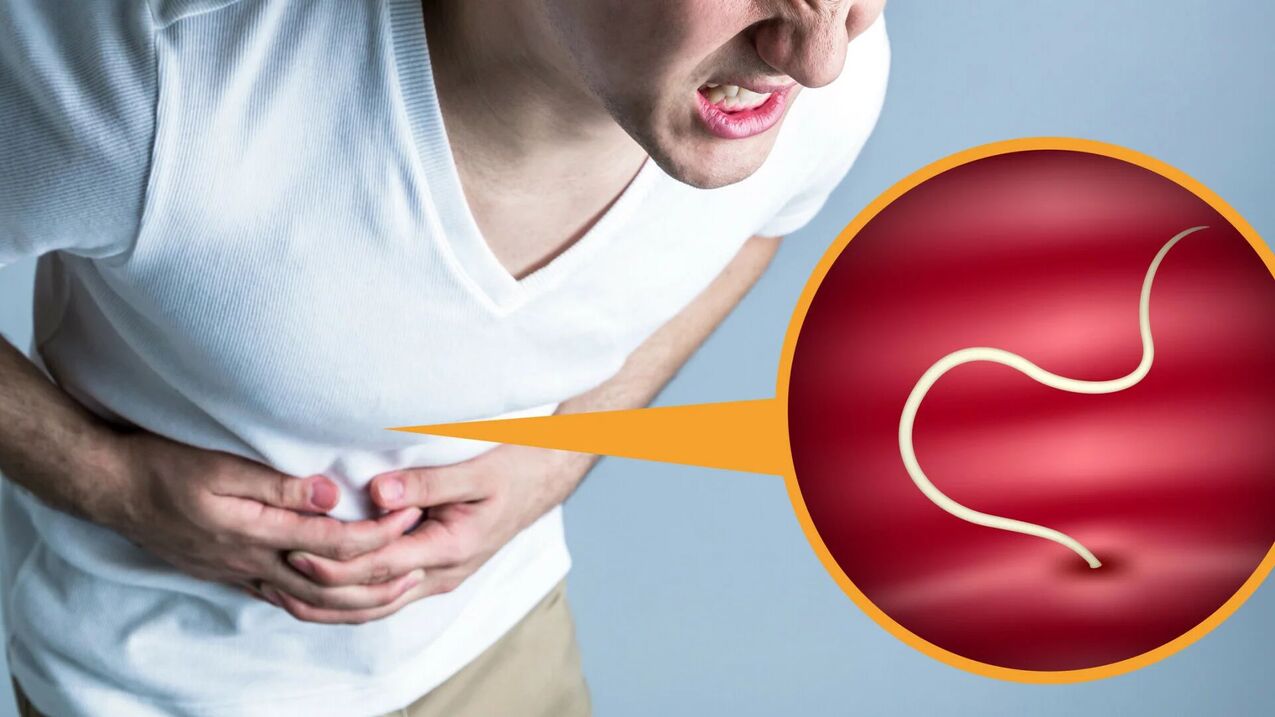Types of parasites that often infect humans
- roundworms;
- pinworm;
- hookworm;
- Giardia;
- Whipworm;
- cattle tapeworm;
- wide tape;
- pork tapeworm;
- Echinococcus tapeworm;
- Trichinella spiralis.

How does infection occur?
General signs that worms are present
allergy
- Tearfulness, eyelid pain, and conjunctivitis
- chronic runny nose
- Shortness of breath, cough
- Rash, peeling, redness, burning sensation
- rosacea, eczema
- Stuck corners and inflamed mouth edges
- Leukocytosis is an increase in white blood cells in the blood
- Scabies in the anal area (pinworms) and body
- Problematic skin and acne
- Asthma and dry cough (hookworm)
- hair loss
Stomach and intestinal upset syndrome
bile stagnation
constipate
Dysbiosis
Low immunity may be the result of internal parasite activity
joint and muscle pain
weight changes
anemia
Nervousness, sleep disorders
"chronic fatigue syndrome"
oncology
Inflammation of the larynx and airways
Specific symptoms of parasitic infection
- Disruption of normal menstrual cycle;
- Vaginal flora dysbiosis, fungal diseases;
- Inflammation of the ovaries, kidneys, and bladder;
- Uterine fibroids;
- Infertility.
- sexual dysfunction;
- Presence of sand or stones in the kidneys or bladder;
- inflammation of the prostate;
- Mental disorders.
Differences in Symptoms in Children and Adults
- saliva;
- gastric juice;
- Local immunity in the intestine.
Diagnosis of parasites

How to determine the presence of parasites
in the intestine
- constipate;
- diarrhea;
- flatulence;
- intestinal obstruction;
- Cramping pain, abdominal cramping;
- lose weight;
- Vomit;
- nervous;
- Loss (or increase) of appetite.
in the stomach
- nausea;
- hiccups;
- salivation;
- heaviness and distension of the stomach;
- diarrhea;
- Bleeding during bowel movements;
- Itching in the anal area due to pinworms;
- Coughing due to stimulation of gastric nerve receptors.
in liver
- Right rib pain;
- hiccups;
- nausea;
- allergic urticaria;
- Yellowing of the sclera, oral mucosa, and skin;
- loss of hair follicles;
- weakness;
- irritable;
- anemia.
in blood
- fever;
- Lymph nodes are thickened, swollen, and painful;
- rash on body;
- dizziness, headache;
- Thirsty;
- lethargy, lethargy;
- difficulty breathing;
- Circulatory disorders, manifested by numbness and coldness of the limbs.
if the heart is damaged
- cough;
- difficulty breathing;
- nervousness, fear;
- weakness;
- chest pain;
- Arrhythmia, bradycardia;
- Temperature, fever alternating with chills;
- changes in blood pressure;
- sweating;
- Pale face and neck;
- anemia.
in lungs
- difficulty breathing;
- difficulty breathing;
- dry cough at night;
- Asthmatic bronchospasm;
- Allergic rhinitis, sneezing;
- chest pain;
- rapid pulse;
- nausea.
under the skin
- A small itchy red rash with large, swollen blisters on the skin;
- Ulcers, abscesses, warts, eczema;
- fever;
- night sweats;
- Dense, mobile tumor-like areas under the skin;
- anemia.
eyes
- Inflammation of the conjunctiva, with burning and itching;
- Pain in eyes, and pain when looking to one side or upward;
- Flying spots, clouds in front of your eyes;
- Dry mucus in the eyes;
- Blurred vision and double vision;
- Headache, dizziness;
- swelling of the eyelids;
- Under eyes appear blue.
in blood
- Mansoniella is a worm that can grow up to 8 centimeters long. Causes dizziness, headaches and joint pain, fever, skin problems, and leg numbness.
- Haemosporidians are single-celled organisms that live in red blood cells.
- Trypanosomatids are the single-celled organisms that cause Chagas disease and sleeping sickness.
- Malaria Plasmodium.
Symptoms of diseases caused by parasites
Ascariasis

- An allergic rash that occurs locally on the patient's feet, hands, and body;
- Increased body temperature, fever;
- general weakness and discomfort;
- Sweating at night and during the day;
- Enlarged liver and pain in ribs;
- Loss of appetite and nausea; abdominal pain and cramping;
- Constipation and diarrhea; weight loss or gain;
- While the roundworms are migrating and settling in the lungs, coughing, shortness of breath, and chest pain may occur;
- Insomnia;
- cognitive decline;
- twitch;
- Obstructive jaundice and intestinal obstruction.
hookworm disease
- Urticaria and dermatitis, when the larvae pierce the skin, swelling occurs at the site of penetration, causing burning and itching;
- When parasites migrate in the human body, bronchitis, tracheitis, and laryngitis can occur. In this case, the patient will develop a cough, shortness of breath, and hoarseness;
- When the larvae reach the intestine, anemia, vomiting, nausea, abdominal pain, constipation, diarrhea, and loss of appetite may occur;
- Irritability, fatigue, insomnia.
Diphyllia filariasis
- lose weight;
- Diarrhea and constipation;
- Loss of appetite;
- low-grade fever;
- increased tiredness and tiredness;
- Presence of worms in the form of white ribbons in feces;
- Cramps and abdominal pain;
- anemia;
- dizziness and headache;
- Cracks and red spots on tongue;
- Pathological processes of the oral cavity and esophagus;
- intestinal obstruction;
- Frustrated.
Taeniasis
- Nausea and vomiting; fragments of parasite larvae may be present in vomitus;
- Diarrhea and constipation;
- weight loss and decreased appetite;
- Cramps and abdominal pain;
- Anal itching;
- dizziness and headache;
- insomnia and excitement;
- When the larvae enter the brain, cysticercosis develops and manifests as speech impairment, epilepsy, delirium, hallucinations, and loss of consciousness;
- When the parasite migrates, it can penetrate the eyes, heart and lungs.
Hydatid disease
- Pain at the site of cyst formation;
- Weakness, increased fatigue, drowsiness;
- Skin irritation in the form of hives and itching;
- Functional disorders of the affected organs: if the liver is affected, appetite worsens, nausea and vomiting occur; if the lungs are affected, cough, shortness of breath, fever occur; if the brain is affected, epilepsy occurs; paralysis of the arms and legs occurs, and cysts form in the heart, which may lead to serious heart disease;
- When a cyst ruptures, the parasite can spread extremely quickly to all internal organs and systems, which can lead to very serious complications and even death of the patient.
Alveolar coccosis
- Itchy skin and hives;
- Bitter mouth, nausea;
- Pain and heaviness in the right rib;
- E. coli;
- Compaction was observed in the liver;
- lose weight;
- weakness and discomfort;
- Severe headaches and dizziness are observed when the parasite is located in the brain.
Giardiasis
- Gastrointestinal disorders: nausea, vomiting, burping, diarrhea, and constipation;
- Specific pain in the navel area;
- Loss of appetite, bloating;
- temperature rise;
- General fatigue and decreased performance;
- irritability and nervousness;
- Itchy skin.
Amebiasis

- Painful diarrhea with frequent bowel movements (up to 20 times), sometimes with blood;
- stomach ache;
- The temperature indicator increases;
- Vomiting and nausea;
- Loss of appetite.
Schistosomiasis
- Patients develop early allergic reactions, manifesting as rash, swelling, cough and hemoptysis, paroxysmal general malaise, joint and muscle pain;
- When the disease becomes chronic, symptoms are limited to disturbances in voiding behavior (pain and pain during urination, increased frequency of urination, nocturnal and daytime urinary incontinence);
- Particularly severe cases can lead to death.


















